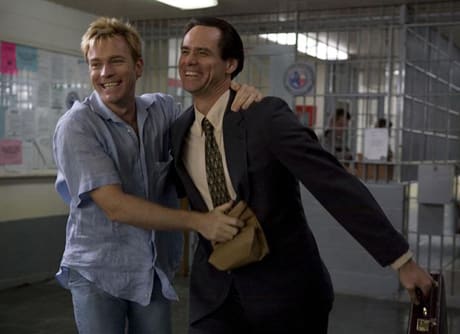By this point, the general prodigiousness of Jim Carrey's chops is beyond questioning by reasonable people. But his original moneymaker – the rubbery, full-body Ace Ventura shtick – is baked so deeply in the cake that it can never be fully eradicated, tending to burble up at inopportune times to sabotage his more substantial work. And with antic, true-life, gay caper fantasia I Love You Phillip Morris, there's burbling of an industrial strength. We first meet Carrey's Steven Russell (archetypal Southern churchgoing family man/closet-case) on the cusp of a serious auto accident that seeds a tidy and tritely rendered epiphany, and a vigorous self-outing. Pursuing a more honest life as a gay man, he heads down to South Beach, but quickly faces the inconvenient truth that "being gay is really expensive." By way of financing his fabulousness, he falls into credit card fraud, to which he takes like a flamboyant duck to water. But Johnny Law gets hip soon enough and after an honourably failed suicide attempt, Russell ends up in the big house, bunking down, and falling knee-bucklingly in love, with the titular con (Ewan McGregor, nimble and utterly winning in a badly underwritten role). First to win his innamorato's release and then to stake him to some cushy domestic bliss, Russell kicks the flimflammery up several notches, setting up a repetitive cycle of scam/arrest/escape that ultimately squanders the trust (if not the love) of the happily clueless, but increasingly scandalized, Morris. Things come to a prolonged head with a jarringly downbeat ending that doesn't jibe with the generally felicity of the preceding events, and then it's everyone off to jail for the final time. I Love You Phillip Morris was widely, if not deliriously, praised upon its wink-and-you-missed-it theatrical release, dying a mysteriously quick death thereafter. Part of the problem may have been the title, which seems to promise something along the Thank You for Smoking line. And some viewers may have been discomfited by how fully invested the two forcefully straight leads are into their un-stereotyped gay roles. Internet chatter puts the blame on the Texas justice system's reluctance to see its fecklessness paraded on screen. But the onscreen product is not blameless. The writers (veterans of Bad Santa) seem hamstrung by the obligations of truth telling and can't scale the scabrously nihilistic heights of their earlier classic, nor find a comfortable tonal balance between caper, yocks and emotional heft. (Compare with Catch Me if You Can, an obvious referent, which did a much better job of showing both the mechanics of the conman's spy craft and its Freudian underpinnings.) The net effect is of a genre mish-mash that frequently entertains but seldom compels. Extras include commentary tracks, some not terribly edifying deleted scenes and a perfunctory making-of. But the one thing that might have won the flick a second DVD life – interviews with the real-life principals, both still alive – is nowhere to be found.
(Alliance)I Love You Phillip Morris
Glenn Ficarra & John Requa

BY Paul DuderPublished May 5, 2011